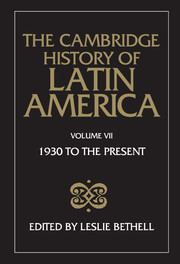10 - Cuba since 1959
from PART THREE - THE CARIBBEAN
Published online by Cambridge University Press: 28 March 2008
Summary
Fulgencio Batista had been the dominant figure in Cuban national affairs for a quarter of a century. He had ruled Cuba, directly or indirectly, since the military coup of 4 September 1933, except for an interlude of Auténtico rule from 1944 to 1952. He had seemed confident and powerful until the last weeks of his last presidency. But suddenly Batista was gone. On New Year's Eve 1958 he quit, taking with him much of the top echelon of his government. A new leader, young and bearded, who for two years had led a guerrilla war in eastern Cuba, gradually spreading the influence of his forces to the western provinces, slowly assuming the leadership of the urban and the rural resistance to the Batista regime, marched into Havana. Audacious and effective in his military campaign and political skills, persuasive and commanding in his public speech, Fidel Castro had become the leader of the future. Power had passed, somewhat unexpectedly, to a new generation of Cubans.
In January 1959 the old regime collapsed in Cuba and a revolution came to power. The old rules of the game no longer applied and the armed forces that had shaped the life of independent Cuba for so long had crumbled. The rebel army became the defender of the new revolutionary state, sweeping aside the parties that had structured political life in previous decades. Only the Communist party (Partido Socialista Popular, PSP), which had been banned by Batista in the 1950s but reappeared in 1959, was left intact.
- Type
- Chapter
- Information
- The Cambridge History of Latin America , pp. 457 - 508Publisher: Cambridge University PressPrint publication year: 1990
References
- 1
- Cited by



